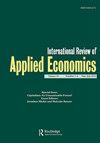Dirty dance: tourism and environment
IF 1.6
Q3 ECONOMICS
引用次数: 6
Abstract
ABSTRACT Tourism was one of the fastest-growing sectors of the global economy before the COVID-19 pandemic, accounting for around 10% of global GDP. This has created a number of challenges including environmental degradation, especially in small island countries where the carbon footprint of tourism constitute a substantial share of carbon dioxide (CO2) emissions. This study investigates the impact of tourism on CO2 emissions in a relatively homogenous panel of 15 Caribbean countries over the period 1960–2019. The results show that international tourist arrivals have a statistically and economically significant effect on CO2 emissions, after controlling for other economic, institutional and social factors. Managing tourism sustainably requires a comprehensive set of policies and reforms aimed at reducing its environmental impact, and curbing excessive dependency on fossil fuel-based energy consumption.肮脏的舞蹈:旅游和环境
摘要新冠肺炎大流行前,旅游业是全球经济增长最快的行业之一,约占全球GDP的10%。这带来了许多挑战,包括环境退化,尤其是在小岛屿国家,旅游业的碳足迹在二氧化碳排放中占很大比例。本研究调查了1960-2019年期间,15个加勒比国家中相对同质的旅游业对二氧化碳排放的影响。结果表明,在控制了其他经济、制度和社会因素后,国际游客入境对二氧化碳排放具有统计和经济显著影响。可持续管理旅游业需要一套全面的政策和改革,旨在减少其对环境的影响,并遏制对化石燃料能源消耗的过度依赖。
本文章由计算机程序翻译,如有差异,请以英文原文为准。
求助全文
约1分钟内获得全文
求助全文
来源期刊

International Review of Applied Economics
ECONOMICS-
CiteScore
4.30
自引率
4.50%
发文量
37
期刊介绍:
International Review of Applied Economics is devoted to the practical applications of economic ideas. Applied economics is widely interpreted to embrace empirical work and the application of economics to the evaluation and development of economic policies. The interaction between empirical work and economic policy is an important feature of the journal. The Journal is peer reviewed and international in scope. Articles that draw lessons from the experience of one country for the benefit of others, or that seek to make cross-country comparisons are particularly welcomed. Contributions which discuss policy issues from theoretical positions neglected in other journals are also encouraged.
 求助内容:
求助内容: 应助结果提醒方式:
应助结果提醒方式:


